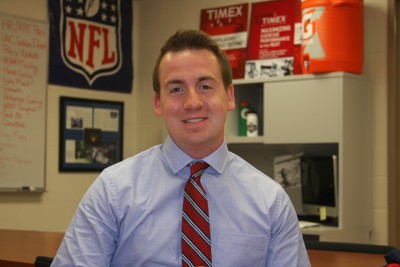 Accolades – below are news and notes from our alumni, faculty, staff, and students. We are proud of all the amazing accomplishments by our Neag family. If you have an accolade to share, we want to hear from you! Please send any news items (and story ideas) to shawn.kornegay@uconn.
Accolades – below are news and notes from our alumni, faculty, staff, and students. We are proud of all the amazing accomplishments by our Neag family. If you have an accolade to share, we want to hear from you! Please send any news items (and story ideas) to shawn.kornegay@uconn.
Students
Jenna Apicella has been selected as a recipient of the 2013 American Kinesiology Association Graduate Student Writing Award. Apicella was the first author on the manuscript entitled “Betaine supplementation enhances anabolic endocrine and Akt signaling in response to acute bouts of exercise” which was published in the European Journal of Applied Physiology.
Lindsey Gervais selected as this year’s Saint Joseph’s College Young Alumni Service Award winner. The Young Alumni Service Award is presented to a graduate of the past ten years who has demonstrated a history of service. The graduate lives the core values of Saint Joseph’s College and serves as an example for other young alumni.
Jennifer Kowitt was invited to review submissions for SIG-Special Education Research for the 2014 Annual Meeting of the American Educational Research Association (AERA) to be held in Philadelphia, Pennsylvania.
Laura Kunces (doctoral student) earned an “EAS Scholarship Award” for leadership in nutrition. Currently serving as social chairman for fellow graduate students at the Neag Graduate School of Education, Kunces serves as advisor to dietetic interns and consultant to all lab groups and research studies in the Department of Kinesiology. A varsity swimmer while earning her BS degree in nutritional sciences at UConn, Kunces earned an MS in clinical nutrition from the University of Memphis and an MS in exercise science from UConn.
Hayley Root (master’s student) and Brittanie Volk (doctoral student) were named recipients of the 2013 Outstanding Graduate Student Scholarship Award by the American Kinesiology Association (AKA).
Doug Sekorski was recognized by the UConn’s Counseling Program for Intercollegiate Athletes with the 2013 Outstanding Tutor Award. This award is given to one tutor who is exceptional in their commitment, responsibility, and tutoring ability. This year Sekorski has received tremendous feedback from our students for his knowledge, innovation, creativity, and dedication.
Alumni
James F. Abromaitis, ‘79 BA (CLAS), ‘82 MA in special education, was named director of athletics at Albertus Magnus College. Prior to becoming AD, he was the executive director of the Capital City Economic Development Authority in Hartford.
Denise Smith Bortner, ’82 BA in recreational service education, was inducted into McSherrytown Women’s Hall of Fame. Bortner was one of the first local athletes to participate in Division I college athletics. While attending UConn, her team won the 1981 Division I NCAA National Field Hockey Championship, the first women’s sports team to win an NCAA national championship. Later, she served as a physical education teacher at St. Francis Xavier School and St. Joseph School.
Burr R. Carlson, ’56 BS in physical education, ’64 MA in kinesiology, was elected to the New England Basketball Hall of Game. He was the first UConn basketball to be drafted by the NBA after playing the 1951-52 season. He chose to be a coach and educator rather than pursue a professional sports career. He coached high school for many years, then UConn in the 1960s and moved on to teaching.
Len Carlson, ’62 BS in education, ’63 MS in education, a longtime assistant for the August State and August College men’s basketball program, was inducted into the New England Basketball Hall of Fame in Worcester, Mass. Carlson made his mark on the court in high school before becoming the leading scorer at the University of Connecticut during his junior and senior seasons. Carlson came to Augusta as an Army lieutenant in 1963. He was a standout player in the Army, and he played professionally from 1965-68 in Belgium. But knee injuries derailed his career — he’s had 24 knee operations. Carlson began coaching at Augusta State in 1968, working as an assistant under Marvin Vanover. During the 1975-76 season, Carlson took a leave of absence to coach professionally in Belgium for one season. He returned to Augusta State and continued as an assistant until 1982. He later returned in 2006 to help the program.
Catherine Carter, ’07 BS in social science-sport leisure, ’13 MA in higher education administration, was appointed assistant director for student services in the School of Communications at Quinnipiac University. Before joining Quinnipiac, Carter worked on her master’s degree at UConn, where she was an academic adviser in the School of Business, first-year experience course instructor, senior-year experience course facilitator and graduate assistant in the Office of Student Services & Advocacy.
Chris Dailey, ’01 MA in educational administration, UConn’s associate head women’s basketball coach, was honored with a $125,000 scholarship fund in her honor through Jim Agonis ’71 (BUS). The Chris Dailey Endowed Scholarship Fund will provide financial support to students who are not players but are involved with the women’s basketball team.
Tamara Fisher, ’04 MA in gifted and talented (three-summers program), was honored as Montana Gifted and Talented Teacher of the Year. Fisher is finishing her 17th year of teaching in Polson, Montana and has seen hundreds of gifted and talented students pass through her classes.
Thomas C. Healy, ’11 Sixth-Year Diploma in educational administration, was named New Western Middle School Assistant Principal. Previously, he was assistant dean of student life for Clark House and a social studies teacher at Greenwich High School.
Victoria Herbst, ’11 BS in animal science, ’13 MA in curriculum and instruction with a minor in science, was tapped to run the family horse farm as the youngest member of her family. A lifelong horseback-riding enthusiast, she will run the horse farm, called Herbst Arabians. Herbst is also currently searching for a teaching job at a vocational agriculture school, such as the institute at Lyman Hall High School or Middletown High School.
Colleen A. Kelley, ’83 Ph.D. in educational studies, recently hosted an illustrated presentation at Southbury Public Library on the current issues plaguing the Middle East. Kelly has worked as a history and Asian studies teacher in New York and Connecticut and taught comparative education and current issues at Central Connecticut State University.
Jack Lichtenthal, ’55 BA, shares that he directed and produced a film on his research “China and the Shanghai Jewish Refugee Museum.” He currently resides in Stamford, CT.
Michael Moynihan, ’09 Sixth-Year Diploma in educational administration, was appointed principal of Waddell Elementary School in Tolland. Prior to that, he was assistant principal at the Birch Grove Primary School in Tolland.
Cindy Ratchelous, ’88 BS in special education, was appointed principal of North Haven’s ACES Mill Road School. Prior to her appointment, she was the assistant principal at ACES since 2007.
Andrew Rockett, ’90 MA in educational administration, ’03 JD, was named principal of Rockville High School in Vernon. Most recently, he served as principal of Killingly High School.
Barbara F. Palmer, ’42 BS in home economics, ’63 MS in guidance counseling, recently passed away at the age of 92. As a parent in 1949, she worked with other mothers to establish the Tolland Parents and Teachers Association for the town’s newly consolidated elementary school. She was instrumental in establishing the first hot lunch program for that school. When the town voted to establish its own high school, she was a member of the general and the departmental curriculum committees. She taught home economics in Rockville High School. In 1967, she moved to the newly opened Tolland High School, working there as a guidance counselor until she retired in 1985. Her daughter, Carol Cadman, works at the Neag School of Education.
Nathan D. Quesnel, ’01 BS in English, ’02 MA in curriculum and instruction, was named to Hartford Business Journal’s “40 Under 40” for 2013. He’s the superintendent for East Hartford Public Schools.
Dick Quinn, ’72, ’75 MA in educational administration, reports that he’s a retired schoolteacher and principal. One of his favorite professors, was Dr. Frank Ballard, ace-puppeteer. In his first six years of teaching, two of his classes in Waterford, CT received the Eugene O’Neil Theater Award. After moving to California, musicals performed by his classes were responsible for his accepting an award from Garry Marshall at the Los Angeles Music Center. The “BRAVO” Award is given to one elementary classroom teacher for work in the arts, and one secondary arts teacher. Retiring after 30+ years in education, he is still in contact with students who have gone into television, and other areas of the arts.
Lauren B. Rodriguez, ’03 MA in gifted and talented, ’07 Sixth-Year Diploma in educational administration, was named principal of Southeast Elementary School in Mansfield. Prior to joining Southeast, she was a site facilitator for under-performing suburban and elementary schools through the Neag School of Education.
Sara Renzulli, ’11 MA, ’13 Ph.D. both in educational psychology, and her advising professor, Jim O’Neil, were featured authors by APA division 51 (Society for the Psychology Study of Men & Masculinity) for their publication “Introduction to the Special Issue: Teaching the Psychology of Men – A Call to Action.” http://www.division51.org/publications/authorspotlight.htm
Jasdeep Sing, ’02 BS in biological sciences, ’03 MA in curriculum and instruction, was named principal at Wolcott Elementary School. A West Hartford resident, Sing was a former middle school science teacher and then interim assistant principal, who took over for Dr. Plato Karafelis – also a Neag alum — who retired in June.
Carol Virostek, ‘96 Ph.D. in curriculum and instruction, was honored by the American Association of University Women (AAUW) with an endowment in her honor, called the Carol R. Virostek Campus Leadership Opportunities Fund. The Fund recognizes her dedication to the growth of AAUW’s popular campus leadership programs and the inspiration she provided during her four years as chair of the national AAUW College/University Committee. She is also a former adjunct professor in the Neag School of Education.
Joseph A. Whelton ’79 BS in rehabilitation services, was named boys basketball coach at Sarasota Christian School, in Sarasota, FL. Prior to joining Sarasota Christian School, he was head coach at State College of Florida and the former sports director of YMCA Venice.
Steven Woznicki, ’05 Sixth-Year Diploma in educational administration, returned to West Hartford to be principal at Braeburn Elementary School. Woznicki worked the first 17 years of his career in West Hartford, then left to become assistant principal at Bristow Middle School in Bristol in 2005 and then lead Jennings School in Bristol, which closed last year.
Faculty/Staff
UConn’s Neag Center for Gifted Education and Talent Development welcomed almost 700 (100 more than expected) educators from across the US and 10 countries to Confratute recently to the Storrs campus. Over the past 36 years, Confratute has attracted more than 20,000 educators worldwide for a highly acclaimed, enrichment-based program. The weeklong program was geared toward providing educators with research-based practical strategies for engagement and enrichment learning for all students, as well as meeting the needs of gifted and talented students.
UConn’s Neag Center for Gifted Education and Talent Development welcomed 75 high school juniors from across CT and the US for Mentor Connection, the an annual three-week summer program for academically talented secondary students. Housed in the Neag School of Education’s Neag Center for Gifted Education and Talent Development, the program ran from July 7-26, 2013 and was designed to provide students with opportunities to participate in creative projects and research investigations under the supervision of university mentors.
UConn’s Neag Center for Gifted Education and Talent Development and the Renzulli Academy welcomed 63 students for the four-week Explorations and Investigations summer program. The students visited Talcott Mountain Science Center, learned about Math with Dr. Rachel McAnallen, Ph.D. ’12, at the UConn Storrs Campus, received technical insight through Technology: Developing a Digital Footprint and Interactive Video Games, and got creative at The Bushnell’s Summer Arts Program.
Postsecondary Disability Training Institute (PTI) had a record year while celebrating its 25th year anniversary with a successful weeklong professional development program. PTI used to be on campus (with no AC), and then moved out to Farmington in the early ’90’s. Since the mid-90s it’s moved around small cities in the Northeast (Newport, Burlington, Saratoga Springs, Portland) and more recently has been in Philadelphia and Boston. Pre-recession they would get about 270-280, and then during the recession, around 240-250. This year they reached over 330 participants. Next year will be in Philadelphia.
Sandy Bell did some work with the Cooperative Extension Educators in New Hampshire on “flipped classrooms.”
Cristina Colon-Semenza and Susan Glenney received a UConn Service Learning Fellowship. The Faculty Fellows program is a professional development and course creation opportunity where the Office of Service-Learning and Institute for Teaching and Learning assist committed faculty interested in teaching a service-learning course.
Lindsay DiStefano received a two-year grant ($150k) from the Charles H. Hood Foundation for Child Health Research, Boston MA. This grant will allow DiStefano to pursue injury prevention efforts in middle-school age children.
Morgaen Donaldson was selected as a 2013 National Academy of Education/Spencer Postdoctoral Fellow. With the generous support of the Spencer Foundation, the Academy created this program to encourage outstanding researchers at the postdoctoral level to pursue critical education research projects. The fellowship award is a $55,000 grant intended to provide release time from teaching and administrative duties. Her fellow will focus on teacher evaluations in New Haven.
Doug Kaufman was quoted in El Mercurio from Chile about his work with writing and changing the culture of the teaching of writing in schools.
Stefanie Mazerolle participated in the EKIN nationwide Athletic Training search, and accepted the position of assistant professor in the Department of Kinesiology.
Brandi Simonsen and George Sugai have in press, “PBIS in restrictive educational settings: Positive support for youth with high-risk behavior” for the publication Education and Treatment of Children.
Mary Yakimowski has a proposal that was accepted to the 2013 NNER Conference in Albuquerque. Her presentation is titled “Assessment Activities with Purposive Partnerships: Solidifying the Map for Continuous Improvement.”
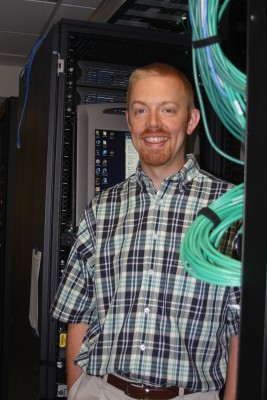
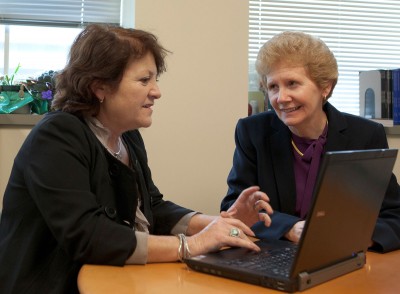

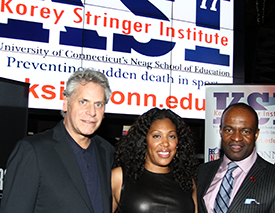
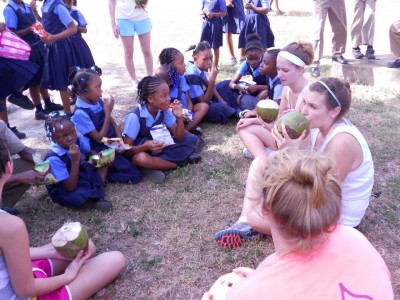

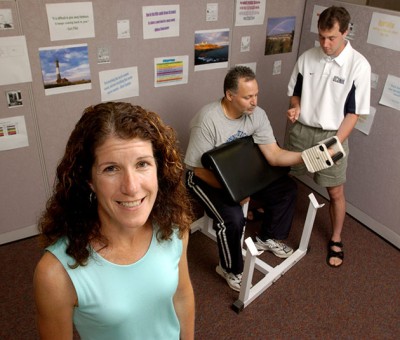
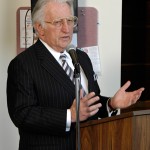
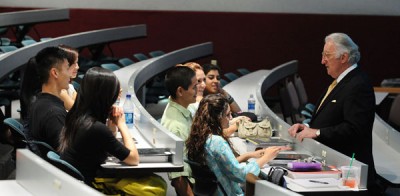
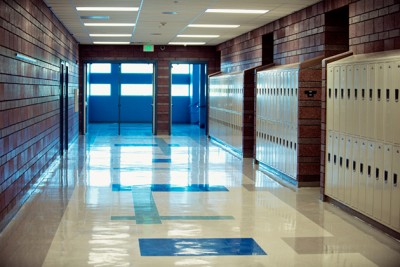 While policymakers and pundits are still debating what changes should be made in the wake of the Newtown school shooting, the
While policymakers and pundits are still debating what changes should be made in the wake of the Newtown school shooting, the 